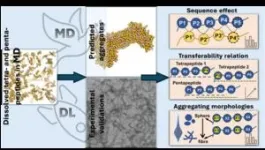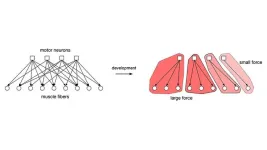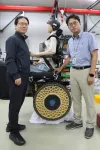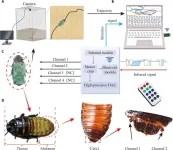Can’t stop belching? Dietary habits or disease could be the reason
Survey of 10,000 Japanese adults reveal leading causes of burp-related disorders
2024-09-03
(Press-News.org)
Belching is a common bodily function, but when it escalates to a level that interferes with daily life, it is defined as belching disorders. International surveys have reported that approximately 1% of adults have belching disorders, but the percentage in Japan and the factors involved often elude medical professionals.
To examine the relationship between the rate of belching disorders, comorbidities, and lifestyles in Japan, a research team led by Professor Yasuhiro Fujiwara of Osaka Metropolitan University’s Graduate School of Medicine conducted a web survey of 10,000 adults. The results showed that 1.5%, or 151 people, had belching disorders. This was more prevalent in those who were men, drank alcohol, and were taking acid reflux medications.
Additionally, it was found that the presence of gastrointestinal disease, eating until feeling full, and extremely low or high chewing frequency were significantly associated with the development of belching disorders. Conversely, a high consumption of carbonated beverages had no association.
“The problem with belching disorders is that they take a long time to treat and are only practiced in a limited number of medical facilities,” stated Professor Fujiwara. “In the future, the evaluation of the number of times someone chews and the effects of improved dietary habits in patients with belching disorders will provide a treatment option for patients to perform on their own.”
The findings were published in The American Journal of Gastroenterology.
###
About OMU
Established in Osaka as one of the largest public universities in Japan, Osaka Metropolitan University is committed to shaping the future of society through “Convergence of Knowledge” and the promotion of world-class research. For more research news, visit https://www.omu.ac.jp/en/ and follow us on social media: X, Facebook, Instagram, LinkedIn.
END
ELSE PRESS RELEASES FROM THIS DATE:
2024-09-03
Scientists from China have investigated how short peptide chains aggregate together in order to deepen our understanding of the process, which is crucial for drug stability and material development. Their study, published in JACS Au, provides valuable insights into how short proteins called peptides interact, fold, and function. These findings have significant implications for medicine, material science, and biotechnology.
Peptides are short chains of amino acids that play essential roles in the body by building structures, speeding up chemical reactions, and supporting our immune system. The specific function of a protein is determined by how its amino acids interact with each other and ...
2024-09-03
A national survey conducted as part of University of Exeter research has found huge variation in treatment for ADHD, highlighting the struggle many young adults face once they turn 18.
Researchers have warned that the current system is failing many young adults as they transition from children’s to adult’s services - suddenly finding themselves unable to access treatment because services do not link up effectively.
More than 750 people from across the country – including commissioners, healthcare professionals working ...
2024-09-02
Embargoed for release until 5:00 p.m. ET on Monday 2 September 2024
Annals of Internal Medicine Tip Sheet
@Annalsofim
Below please find summaries of new articles that will be published in the next issue of Annals of Internal Medicine. The summaries are not intended to substitute for the full articles as a source of information. This information is under strict embargo and by taking it into possession, media representatives are committing to the terms of the embargo not only on their own behalf, but also on behalf of the organization they represent.
----------------------------
1. ...
2024-09-02
Early detection of breast cancer through mammography screening continues to save lives. However, abnormal findings on mammograms can lead to women being recalled for additional imaging and biopsies, many of which turn out to be “false positives,” meaning they do not result in a cancer diagnosis. False positives can also have financial implications for patients and cause significant emotional anxiety.
A major, new study led by the UC Davis Comprehensive Cancer Center has found that women who received a false-positive result that required additional imaging or biopsy were less likely to return ...
2024-09-02
When you ask a rideshare app to find you a car, the company’s computers get to work. They know you want to reach your destination quickly. They know you’re not the only user who needs a ride. And they know drivers want to minimize idle time by picking up someone nearby. The computer’s job, says Cold Spring Harbor Laboratory Associate Professor Saket Navlakha, is to pair drivers with riders in a way that maximizes everyone’s happiness.
Computer scientists like Navlakha call this bipartite matching. It’s the same task handled by systems pairing organ donors with transplant candidates, medical students with residency ...
2024-09-02
By Emily Greenhalgh
One of the most diverse ecosystems on the planet is closer than you think — right inside your mouth. Your mouth is a thriving ecosystem of more than 500 different species of bacteria living in distinct, structured communities called biofilms. Nearly all of these bacteria grow by splitting [or dividing] into two, with one mother cell giving rise to two daughter cells.
New research from the Marine Biological Laboratory (MBL) and ADA Forsyth uncovered an extraordinary mechanism of cell division in Corynebacterium matruchotii, one of the most common bacteria living in dental plaque. ...
2024-09-02
A new technology for wheels and mobile systems, necessary for overcoming various obstacles in daily life such as stairs or rocks by adjusting the stiffness of the wheel in real time, has been developed for the first time in the world. This noble technology is anticipated to find wide applications in various moving vehicles equipped with wheels, where overcoming terrain obstacles is essential.
The Korea Institute of Machinery and Materials (President Seog-Hyeon Ryu, hereinafter referred to as KIMM), an institute under the jurisdiction of the ...
2024-09-02
Melbourne researchers have made a world first breakthrough into creating blood stem cells that closely resemble those in the human body. And the discovery could soon lead to personalised treatments for children with leukaemia and bone marrow failure disorders.
The research, led by Murdoch Children’s Research Institute (MCRI) and published in Nature Biotechnology, has overcome a major hurdle for producing human blood stem cells, which can create red cells, white blood cells and platelets, that closely match those in the human embryo.
MCRI Associate Professor Elizabeth Ng said the team had made a significant discovery in human blood stem ...
2024-09-02
Genetic variants linked to a rare form of bicuspid aortic valve disease that affects young adults and can lead to dangerous and potentially life-threatening aortic complications have been identified by researchers at UTHealth Houston.
The study was published today in the American Journal of Human Genetics.
“We previously found that young individuals who present due to early onset thoracic aortic dissections are more likely to have bicuspid aortic valves and more likely to have rare variants in bicuspid aortic valve-associated genes,” said Siddharth Prakash, MD, PhD, co-principal investigator of the study and associate professor of medical ...
2024-09-02
A research paper by scientists at Beijing Institute of Technology proposed a universal system for remote signal output control using infrared signals.
The new research paper, published on Jul. 05 in the journal Cyborg and Bionic Systems, proposed a system that integrates high-precision digital-to-analog converters capable of generating customized waveform electrical stimulation signals within defined ranges. This enhances the accuracy of locomotion control in cyborg insects while maintaining real-time control and dynamic parameter adjustment. The proposed system is verified by experiments.
The integration of electronic stimulation devices with insects in ...
LAST 30 PRESS RELEASES:
[Press-News.org] Can’t stop belching? Dietary habits or disease could be the reason
Survey of 10,000 Japanese adults reveal leading causes of burp-related disorders







